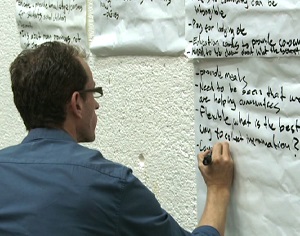by Serah Aupong – EM TV, Port Moresby
A part of Papua New Guinea’s recent history has been lost to time.
Efforts to capture the oral history of World War II through the eyes of Papua New Guineans have shown that a lot of Papua New Guineans who witnessed the war first-hand have passed on.
There is now an urgency to capture more of these stories throughout the country.
Dr Andrew Moutu is the director of the National Museum and Arts Gallery. From the experience that they have had in documenting WWII stories along the Kokoda Track and in Central province, they find that the work is overwhelming on so many fronts.
“Because we are dealing with Papua New Guinean subjects, we thought we would do this orally. Much of what we know of Papua New Guinean history cannot be found in books; very few Papua New Guineans write and some of them are now in archival materials, but photographs and such can lead us somewhere,” he said.
The capturing of WWII stories in Kokoda and Central province comes under the oral history program, supported by the Kokoda Initiative. The Kokoda Initiative is a bilateral program between the Australian and Papua New Guinean governments.
The team leader of the oral history program, Dr Jonathan Ritchie, describes Papua New Guineans’ perspectives on WWII history as a dark hole. Apart from Ben Moides book, very little is known about the Papua New Guinean experience that is told by a Papua New Guinean.
“These stories haven’t been told and it is high time that they are told, and this is what this exercise is about. It’s about capturing stories not just for now but also for future generations,” Dr Ritchie says.
According to Dr Moutu, the sad reality is that we might be a little too late to fully capture this part of Papua New Guinea’s recent history.
“Sorry to say that much of it has been lost. The value of this exercise could have been more fixated if it had been done when surviving members of the Fuzzy Wuzzy and Papuan Infantry Battalion were still around.”
Capturing such stories throughout the country is something that needs detailed planning. This week the National Museum is hosting a workshop that looks at the next step of the pilot project and at finding ways to ensure it can be successfully rolled out in other provinces.
Dr Moutu hopes this will contribute towards the Museums vision of seeing more Papua New Guineans placing greater value on their history.
He said most times history is “relegated to the backwaters of history lessons” in classrooms and is not given the value that it deserves.
“We want to foster a deeper appreciation of history and the knowledge of history to be utilised elsewhere.”
https://youtube.com/watch?v=Sk3v4YhznGc%3Ffeature%3Doembed%26wmode%3Dopaque%26showinfo%3D0%26showsearch%3D0%26rel%3D0


